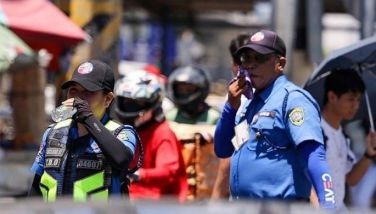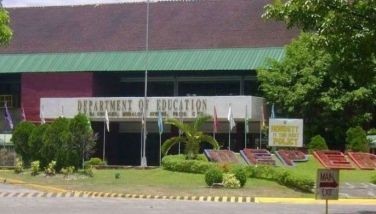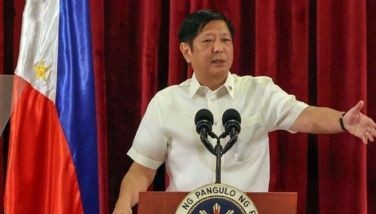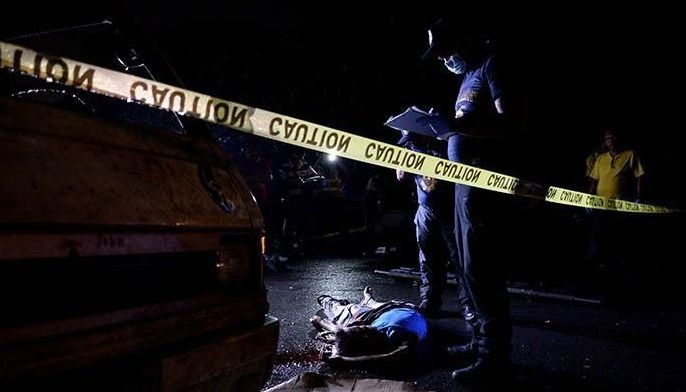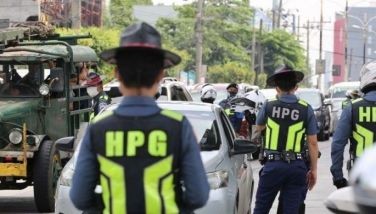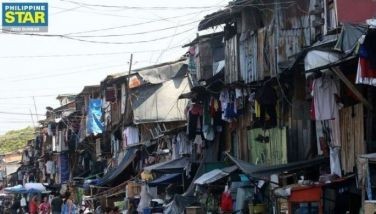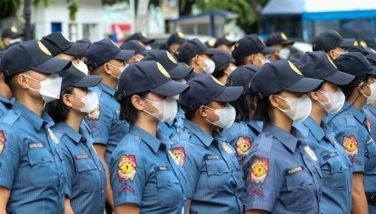Two kims in conflict: Ex-Sokor president calls successor ‘the worst’
September 15, 2002 | 12:00am
What happens when two heroes fight? Surely the ground shudders. But this isn’t happening in the Republic of Korea, where wounds inflicted are always serious and "terrible," but a tenacious, long-suffering, persistent and long-patient nation absorbs them all.
Last Monday, we met in the "Blue House" with President Kim Dae Jung, 77, who had grown more visibly aged and drawn since the last time I saw him two years ago. He had barely recovered from pneumonia, and I noticed make-up on his face (something he had never indulged in before) possibly to conceal the paleness of his pallor. Although his replies to questions asked him by chosen interlocutors in our group of 30 editors and publishers were direct and forceful, many of us suspected they had been prepared beforehand.
It was, indeed, a surprise to some Korean journalists and politicians we met afterwards that the President had been "well enough" to cope with 30 journalists from Asia, Europe and the United States at an hour-long conference in the Palace.
On Wednesday, I had the privilege of meeting one-on-one with Dae Jung’s immediate predecessor, former President Kim Young Sam, 75, who surprised me with the categorical statement: "Kim Dae Jung will go down in history as the most unfortunate president Korea has had." When I asked him how to interpret the polite phrase "most unfortunate," the curt response was, "He is the worst."
Since the last time this writer interviewed him (also in the "Blue House") in September 1997, seven months before his over five-year term expired on Feb. 25, 1998, King Young Sam had lived a seemingly quiet life of "retirement," returning to the unassuming but comfortable home he had lived in for 34 years. What gave him credibility, many Koreans I knew had told me, was the fact that, in contrast to all previous Presidents (mostly generals), Young Sam had obviously not accumulated great wealth, or acquired property and "many mansions." To their knowledge, they said, there was only a house inherited from his parents in Busan City (formerly spelled Pusan), his hometown in the south – where incidentally, the mammoth Asian Games are being held at the end of this month.
The ex-President is widely regarded as a "king-maker" in the coming presidential elections, which fall on December 19. Like Kim Y.S. did in 1998, President Kim Dae Jung will relinquish that office on February 25, 2003. (South Korean presidents, under the Constitution, can serve only for five years, without reelection).
In sum, whoever he decides to support in the current election campaign which has just begun will have the edge in winning what presently looms as a three-cornered fight, but may be enlarged later if two or more candidates also decided to throw their hats (or girdles) into the ring.
This is what gives Kim Young Sam’s words weight.
When I pointed out that the President had said he had successfully brought South Korea out of the Asian financial crisis, posting a gain of $83.9 billion, acquiring an international reserve which had soared from a mere $3.9 billion to $116 billion, and had attracted $66 billion in foreign investments, Mr. Kim Young Sam was visibly irritated. He waved his hand in dismissal of those statistics.
He declared: "Dae Jung may trot out such impressive figures. But just wait and see: he will not be accepted to play an active role in Korean life and government after he steps down from his position. His immense wealth (he accumulated) will be confiscated by the government as soon as he’s no longer President."
Those were astonishingly strong words, so I sought clarification.
"Are you referring to his two sons who are now in prison, accused of taking millions of dollars in bribes and of influence-peddling?" (Kim Hong Up, 52, and his younger brother Kim Hong Gul, 38, two of the President’s three sons are in jail).
"No," the former Chief Executive responded. "It is President Kim himself who ought to be investigated. His Asia Pacific Foundation, controlled by him, has been taking in huge sums from the chaebols and other ‘contributors’ over the past few years. I can say without hesitation that many Koreans already know how corrupt Dae Jung has been."
He pointed out that he had been receiving many National Assemblymen in his home, and they had told him of increasing public awareness of the fact that President Kim "had screwed up the country."
The reason for the Americanisms in this piece may be the fact that, while Mr. Kim Young Sam spoke in Hanggeul, the Korean language, his remarks were translated by his lawyer and longtime confidant, Dr. Joungwon Alex Kim, Ph.D., J.D. (a member of the New York and Washington DC Bars), and Distinguished Professor of International Politics and Law at Sejong University. (Kim J. A. had gone to Harvard Law and SAIS, John Hopkins University, in Washington DC).
Kim Young Sam himself speaks English but is not at home in it, and is more fluent in Japanese (Nihongo) despite his strongly nationalistic antagonism to previous Japanese "colonial" rule in Korea which lasted from 1910 to the end of the Pacific War. Recently, however, Mr. Kim Y.S. was honored with a Doctorate from Tokyo’s renowned Waseda University, and will go there as a Visiting Professor to deliver two landmark lectures on "Values and a Philosophy of Life," as well as "Life in the Modern World." (I hope I got that right. It was a four-hour gab session, concluding with a delicious dinner, spiced with kim-chi, the ever-present tongue-burning perker-upper, and cause of the national bad breath).
When I reminded the ex-President that his own son Kim Hyun Chul, at that time 38 years of age, had been implicated in a bribery scandal himself, arrested and charged with taking $3.6 million in bribes, Mr. Kim Young Sam said that his son has been cleared by the court and released from prison.
"I never interfered with the judicial process," he asserted. Proof of his son Hyun Chul’s innocense, he added, was the fact that he had been exonerated by the court after Kim was no longer President.
When Kim Dae Jung assumed office, in fact, Young Sam recalled, Dae Jung (whom his translator referred to as "D.J.") tried to pin allegations of corruption on him. The President had ordered all his actuations, records, and bank accounts or financial resources investigated. "But they found nothing detrimental," Young Sam snorted. "Which is why I’m here, freely talking to you."
There’s obviously no love lost between the two, who were once, in a sense, allies in the fight to free South Korea from the military yoke.
Kim Young Sam warned that "once Mr. Kim Dae Jung is no longer President, there will be many revelations." I inquired directly: "What will happen to him?" My host simply smiled and retorted: "I don’t want to spell out everything that will happen. It’s too early to say – but come back and have a look when he steps down."
Several of his former Cabinet members, associates, and secretaries, he hinted, are already in the dock for "corruption" themselves.
Mr. Kim further warned of the dangers of the current "sunshine policy" being pursued, and recently renewed after the hiatus which followed a naval clash last June 29, by President Kim Dae Jung. "That fellow up north (Communist Great Leader Kim Jong-Il – see, they’re all named "Kim") cannot be trusted. He’ll use everything that’s given to him to beef up his army and his military resources."
He alleged that, though the government won’t publicize it, the Kim Dae Jung government has already given $900 million in cash to Kim Jong-Il and Pyongyang, plus at least 600 million tons of grain and food aid to starving North Korea. "Do you think that food is really reaching the people? he asked. As for the cash, he feared it had been used to strengthen the North Korean military instead.
When I inquired what he thought of Japanese Prime Minister Junichiro Koizumi’s impending visit to Pyongyang next Tuesday (Sept. 17), he commented that he hoped Mr. Koizumi wouldn’t commit giving any aid or "reparations" to North Korea. (The Japanese prime minister is scheduled to fly to Pyongyang in the morning then return to Tokyo that same night, after four to five hours of meeting with Kim Jong-Il – with one of the subjects the ‘return’ of 11 Japanese nationals abducted to North Korea over the years). "Three of those nine kidnapped Japanese have already died," Kim Young Sam reminded me.
When I said I’d learned that Kim Jong-Il was asking for something like $25 billion in reparations and aid, Kim Young Sam said: "Every dollar, won, or yen, given Kim Jong-Il will be utilized by him to strengthen his armed forces and procure more weapons and military hardware – and thereby pose an even greater threat to South Korea. He must consider that at all times!"
He recalled that during his entire five-year term he had fruitlessly attempted to "reach out" to the North Koreans, and their "leader" Jong-Il in particular. Everytime, he remembered, they asked for things, but were willing to give nothing back in return. "How can you have such a one-way relationship? They hate us. They’ve been brainwashed that way. As long as Kim Jong-Il is there, any effort or initiative appears useless. How can Dae Jung so naively trust that guy?"
If anyone tends to doubt Young Sam’s decisiveness and strength of purpose, it’s instructive to recal that it was during his presidency that two former Presidents, both former Generals, were arrested, charged and convicted. These were ex-Presidents Roh Tae Woo and Chun Doo Hwan. Roh, who had been a Major-General, had been the first to fall. It was revealed by a former government minister that an "ex-president" had hidden 400 billion won ($500 million) in accounts in several city banks. When this was found to have been former President Roh, the ex-Chief Executive himself admitted in a public address that while in office, he had accumulated a "slash" fund of 500 billion won (about $625 million). He confessed he had left office with 185 billion won of that amount, pleading that such funding was "an old political practice." He tearfully said he was "deeply ashamed." He was ordered arrested by prosecutors on November 15 of that year on corruption charges.
His predecessor, Chun Doo Hwan, who had placed Kim Young Sam under three-year "house arrest" and expelled him from the National Assembly, was next investigated. Ex-President Chun refused to cooperate and had burned or destroyed the account books of contributors. When he was arrested, Chun defiantly went on "hunger strike," which is significant since Kim Young Sam had once staged a 23-day hunger strike himself to protest the Chun dictatorship. (Chun was tagged as Prisoner Number 3124).
You all remember the TV and photographic images that astonished, shocked, and impressed the watching world: the spectacle of two former Korean Presidents in prison garb, handcuffed, later images of them standing up, holding hands as they were sentenced in court on corruption and treason charges in August 1996.
If you’d like to know more about the trial, I must comment the fascinating book of Don Oberdorfer of the "Washington Post" which I’ve been carrying around as my bible on contemporary Korea for the past four years. It’s entitled, "The Two Koreas" (Addision-Wesley, Reading Massachusetts, 1997).
In his well-documented volume, Oberdorfer recounts that Hyundai Group founder Chung Ju Yung had disclosed in early 1992 that when he visited President Roh, "at first I gave him two to three billion won, each time, but as I felt it was not enough, I gave him another five billion won, and then, two years ago, the last time, I gave him ten billion won."
Roh responded by saying he had received Chung’s funds to help "unfortunate neighbors."
Oberdorfer further related an episode in which prosecutors had "discovered hundreds of tacks of 10,000-won notes belonging to Chun, totalling 6.1 billion won, stuffed into 25 apple boxes in the cement warehouse of the Sangyong Group, a Seoul conglomerate. Photographs of this other lode of currency, prominently public and broadcast by the Korean press, disgusted the public."
Almost all of the funds had come from the giant chaebols or monopolistic conglomerates and other big business organizations, whose chiefs and CEOs had been summoned by both Roh and Chun from time to time and were expected to bring "contributions." Is there anything new under the sun?
On August 26, 1996, the two ex-presidents were found guilty by a three-judge court. Chun was meted out "death," while Roh was sentenced to 22 and a half years in jail. On December 16, the High Court commuted Chun’s sentence to life imprisonment and reduced Roh’s to 17 years. Kim Young Sum told me last Wednesday that before he left office, he had "pardoned" the two former Presidents, on the unwritten condition that they live quiet lives, and not engage in any public or political activity.
"They’re here, to my knowledge, living in Seoul," Young Sam said.
It’s sad that two former opposition leaders who paid their dues in the freedom struggle, being persecuted by General Park Chung-Hee, for instance, and both arrested by that despot, should be at such loggerheads today. Both were authentic heroes of that fight for democracy and freedom. Kim Young Sam, always in opposition, was elected and reelected to the National Assembly 19 times! His picture hangs on one wall, a handsome young man at a microphone, giving a speech as the youngest elected Assemblyman – at the age of 25.
I’ve known Kim Dae Jung much longer, in fact. I first met him 15 years ago when I had dinner with him in his modest home in the city – and, after our dialogue and repast, he had presented me with a laccuered plate containing a poem he had written about freedom. This Nobel Prize laureate, a friend of my hero and former prison cell-mate Ninoy Aquino, became the best-known leader of the opposition in 1973, when agents of the dictator, President Park Chung Hee smashed into his hotel room in Tokyo, drugged him, then crammed him into a steamer trunk, and smuggled him out of Japan for imprisonment by the despot. Initially placed under house arrest, he was later re-arrested and thrown into prison for "inciting" violent demonstrations and student riots against the regime.
It’s said that in the past two years, Kim Dae Jung has been cracking down on certain critics in the press – using, incidentally, the "tax evasion" weapon.
Whether the accusations of his being corrupt can be substantiated, we’ll have to wait and see. His party has been losing the latest by-elections, however, and it’s clear that not only he himself, but possibly most of his "Millenium Democratic Party," may be on the way out.
However, as even King Young Sam warned when he declined to let his "choice" be known until a week or two from now: "It’s 100 days to election day" (that was last Wednesday), and "the Korean people have been known to change their minds, depending on events."
Last Monday, we met in the "Blue House" with President Kim Dae Jung, 77, who had grown more visibly aged and drawn since the last time I saw him two years ago. He had barely recovered from pneumonia, and I noticed make-up on his face (something he had never indulged in before) possibly to conceal the paleness of his pallor. Although his replies to questions asked him by chosen interlocutors in our group of 30 editors and publishers were direct and forceful, many of us suspected they had been prepared beforehand.
It was, indeed, a surprise to some Korean journalists and politicians we met afterwards that the President had been "well enough" to cope with 30 journalists from Asia, Europe and the United States at an hour-long conference in the Palace.
On Wednesday, I had the privilege of meeting one-on-one with Dae Jung’s immediate predecessor, former President Kim Young Sam, 75, who surprised me with the categorical statement: "Kim Dae Jung will go down in history as the most unfortunate president Korea has had." When I asked him how to interpret the polite phrase "most unfortunate," the curt response was, "He is the worst."
Since the last time this writer interviewed him (also in the "Blue House") in September 1997, seven months before his over five-year term expired on Feb. 25, 1998, King Young Sam had lived a seemingly quiet life of "retirement," returning to the unassuming but comfortable home he had lived in for 34 years. What gave him credibility, many Koreans I knew had told me, was the fact that, in contrast to all previous Presidents (mostly generals), Young Sam had obviously not accumulated great wealth, or acquired property and "many mansions." To their knowledge, they said, there was only a house inherited from his parents in Busan City (formerly spelled Pusan), his hometown in the south – where incidentally, the mammoth Asian Games are being held at the end of this month.
The ex-President is widely regarded as a "king-maker" in the coming presidential elections, which fall on December 19. Like Kim Y.S. did in 1998, President Kim Dae Jung will relinquish that office on February 25, 2003. (South Korean presidents, under the Constitution, can serve only for five years, without reelection).
In sum, whoever he decides to support in the current election campaign which has just begun will have the edge in winning what presently looms as a three-cornered fight, but may be enlarged later if two or more candidates also decided to throw their hats (or girdles) into the ring.
This is what gives Kim Young Sam’s words weight.
When I pointed out that the President had said he had successfully brought South Korea out of the Asian financial crisis, posting a gain of $83.9 billion, acquiring an international reserve which had soared from a mere $3.9 billion to $116 billion, and had attracted $66 billion in foreign investments, Mr. Kim Young Sam was visibly irritated. He waved his hand in dismissal of those statistics.
He declared: "Dae Jung may trot out such impressive figures. But just wait and see: he will not be accepted to play an active role in Korean life and government after he steps down from his position. His immense wealth (he accumulated) will be confiscated by the government as soon as he’s no longer President."
Those were astonishingly strong words, so I sought clarification.
"Are you referring to his two sons who are now in prison, accused of taking millions of dollars in bribes and of influence-peddling?" (Kim Hong Up, 52, and his younger brother Kim Hong Gul, 38, two of the President’s three sons are in jail).
"No," the former Chief Executive responded. "It is President Kim himself who ought to be investigated. His Asia Pacific Foundation, controlled by him, has been taking in huge sums from the chaebols and other ‘contributors’ over the past few years. I can say without hesitation that many Koreans already know how corrupt Dae Jung has been."
He pointed out that he had been receiving many National Assemblymen in his home, and they had told him of increasing public awareness of the fact that President Kim "had screwed up the country."
The reason for the Americanisms in this piece may be the fact that, while Mr. Kim Young Sam spoke in Hanggeul, the Korean language, his remarks were translated by his lawyer and longtime confidant, Dr. Joungwon Alex Kim, Ph.D., J.D. (a member of the New York and Washington DC Bars), and Distinguished Professor of International Politics and Law at Sejong University. (Kim J. A. had gone to Harvard Law and SAIS, John Hopkins University, in Washington DC).
Kim Young Sam himself speaks English but is not at home in it, and is more fluent in Japanese (Nihongo) despite his strongly nationalistic antagonism to previous Japanese "colonial" rule in Korea which lasted from 1910 to the end of the Pacific War. Recently, however, Mr. Kim Y.S. was honored with a Doctorate from Tokyo’s renowned Waseda University, and will go there as a Visiting Professor to deliver two landmark lectures on "Values and a Philosophy of Life," as well as "Life in the Modern World." (I hope I got that right. It was a four-hour gab session, concluding with a delicious dinner, spiced with kim-chi, the ever-present tongue-burning perker-upper, and cause of the national bad breath).
When I reminded the ex-President that his own son Kim Hyun Chul, at that time 38 years of age, had been implicated in a bribery scandal himself, arrested and charged with taking $3.6 million in bribes, Mr. Kim Young Sam said that his son has been cleared by the court and released from prison.
"I never interfered with the judicial process," he asserted. Proof of his son Hyun Chul’s innocense, he added, was the fact that he had been exonerated by the court after Kim was no longer President.
When Kim Dae Jung assumed office, in fact, Young Sam recalled, Dae Jung (whom his translator referred to as "D.J.") tried to pin allegations of corruption on him. The President had ordered all his actuations, records, and bank accounts or financial resources investigated. "But they found nothing detrimental," Young Sam snorted. "Which is why I’m here, freely talking to you."
There’s obviously no love lost between the two, who were once, in a sense, allies in the fight to free South Korea from the military yoke.
Kim Young Sam warned that "once Mr. Kim Dae Jung is no longer President, there will be many revelations." I inquired directly: "What will happen to him?" My host simply smiled and retorted: "I don’t want to spell out everything that will happen. It’s too early to say – but come back and have a look when he steps down."
Several of his former Cabinet members, associates, and secretaries, he hinted, are already in the dock for "corruption" themselves.
Mr. Kim further warned of the dangers of the current "sunshine policy" being pursued, and recently renewed after the hiatus which followed a naval clash last June 29, by President Kim Dae Jung. "That fellow up north (Communist Great Leader Kim Jong-Il – see, they’re all named "Kim") cannot be trusted. He’ll use everything that’s given to him to beef up his army and his military resources."
He alleged that, though the government won’t publicize it, the Kim Dae Jung government has already given $900 million in cash to Kim Jong-Il and Pyongyang, plus at least 600 million tons of grain and food aid to starving North Korea. "Do you think that food is really reaching the people? he asked. As for the cash, he feared it had been used to strengthen the North Korean military instead.
When I inquired what he thought of Japanese Prime Minister Junichiro Koizumi’s impending visit to Pyongyang next Tuesday (Sept. 17), he commented that he hoped Mr. Koizumi wouldn’t commit giving any aid or "reparations" to North Korea. (The Japanese prime minister is scheduled to fly to Pyongyang in the morning then return to Tokyo that same night, after four to five hours of meeting with Kim Jong-Il – with one of the subjects the ‘return’ of 11 Japanese nationals abducted to North Korea over the years). "Three of those nine kidnapped Japanese have already died," Kim Young Sam reminded me.
When I said I’d learned that Kim Jong-Il was asking for something like $25 billion in reparations and aid, Kim Young Sam said: "Every dollar, won, or yen, given Kim Jong-Il will be utilized by him to strengthen his armed forces and procure more weapons and military hardware – and thereby pose an even greater threat to South Korea. He must consider that at all times!"
He recalled that during his entire five-year term he had fruitlessly attempted to "reach out" to the North Koreans, and their "leader" Jong-Il in particular. Everytime, he remembered, they asked for things, but were willing to give nothing back in return. "How can you have such a one-way relationship? They hate us. They’ve been brainwashed that way. As long as Kim Jong-Il is there, any effort or initiative appears useless. How can Dae Jung so naively trust that guy?"
If anyone tends to doubt Young Sam’s decisiveness and strength of purpose, it’s instructive to recal that it was during his presidency that two former Presidents, both former Generals, were arrested, charged and convicted. These were ex-Presidents Roh Tae Woo and Chun Doo Hwan. Roh, who had been a Major-General, had been the first to fall. It was revealed by a former government minister that an "ex-president" had hidden 400 billion won ($500 million) in accounts in several city banks. When this was found to have been former President Roh, the ex-Chief Executive himself admitted in a public address that while in office, he had accumulated a "slash" fund of 500 billion won (about $625 million). He confessed he had left office with 185 billion won of that amount, pleading that such funding was "an old political practice." He tearfully said he was "deeply ashamed." He was ordered arrested by prosecutors on November 15 of that year on corruption charges.
His predecessor, Chun Doo Hwan, who had placed Kim Young Sam under three-year "house arrest" and expelled him from the National Assembly, was next investigated. Ex-President Chun refused to cooperate and had burned or destroyed the account books of contributors. When he was arrested, Chun defiantly went on "hunger strike," which is significant since Kim Young Sam had once staged a 23-day hunger strike himself to protest the Chun dictatorship. (Chun was tagged as Prisoner Number 3124).
You all remember the TV and photographic images that astonished, shocked, and impressed the watching world: the spectacle of two former Korean Presidents in prison garb, handcuffed, later images of them standing up, holding hands as they were sentenced in court on corruption and treason charges in August 1996.
If you’d like to know more about the trial, I must comment the fascinating book of Don Oberdorfer of the "Washington Post" which I’ve been carrying around as my bible on contemporary Korea for the past four years. It’s entitled, "The Two Koreas" (Addision-Wesley, Reading Massachusetts, 1997).
In his well-documented volume, Oberdorfer recounts that Hyundai Group founder Chung Ju Yung had disclosed in early 1992 that when he visited President Roh, "at first I gave him two to three billion won, each time, but as I felt it was not enough, I gave him another five billion won, and then, two years ago, the last time, I gave him ten billion won."
Roh responded by saying he had received Chung’s funds to help "unfortunate neighbors."
Oberdorfer further related an episode in which prosecutors had "discovered hundreds of tacks of 10,000-won notes belonging to Chun, totalling 6.1 billion won, stuffed into 25 apple boxes in the cement warehouse of the Sangyong Group, a Seoul conglomerate. Photographs of this other lode of currency, prominently public and broadcast by the Korean press, disgusted the public."
Almost all of the funds had come from the giant chaebols or monopolistic conglomerates and other big business organizations, whose chiefs and CEOs had been summoned by both Roh and Chun from time to time and were expected to bring "contributions." Is there anything new under the sun?
On August 26, 1996, the two ex-presidents were found guilty by a three-judge court. Chun was meted out "death," while Roh was sentenced to 22 and a half years in jail. On December 16, the High Court commuted Chun’s sentence to life imprisonment and reduced Roh’s to 17 years. Kim Young Sum told me last Wednesday that before he left office, he had "pardoned" the two former Presidents, on the unwritten condition that they live quiet lives, and not engage in any public or political activity.
"They’re here, to my knowledge, living in Seoul," Young Sam said.
It’s sad that two former opposition leaders who paid their dues in the freedom struggle, being persecuted by General Park Chung-Hee, for instance, and both arrested by that despot, should be at such loggerheads today. Both were authentic heroes of that fight for democracy and freedom. Kim Young Sam, always in opposition, was elected and reelected to the National Assembly 19 times! His picture hangs on one wall, a handsome young man at a microphone, giving a speech as the youngest elected Assemblyman – at the age of 25.
I’ve known Kim Dae Jung much longer, in fact. I first met him 15 years ago when I had dinner with him in his modest home in the city – and, after our dialogue and repast, he had presented me with a laccuered plate containing a poem he had written about freedom. This Nobel Prize laureate, a friend of my hero and former prison cell-mate Ninoy Aquino, became the best-known leader of the opposition in 1973, when agents of the dictator, President Park Chung Hee smashed into his hotel room in Tokyo, drugged him, then crammed him into a steamer trunk, and smuggled him out of Japan for imprisonment by the despot. Initially placed under house arrest, he was later re-arrested and thrown into prison for "inciting" violent demonstrations and student riots against the regime.
It’s said that in the past two years, Kim Dae Jung has been cracking down on certain critics in the press – using, incidentally, the "tax evasion" weapon.
Whether the accusations of his being corrupt can be substantiated, we’ll have to wait and see. His party has been losing the latest by-elections, however, and it’s clear that not only he himself, but possibly most of his "Millenium Democratic Party," may be on the way out.
However, as even King Young Sam warned when he declined to let his "choice" be known until a week or two from now: "It’s 100 days to election day" (that was last Wednesday), and "the Korean people have been known to change their minds, depending on events."
BrandSpace Articles
<
>
- Latest
- Trending
Trending
Latest
Trending
Latest
Recommended















